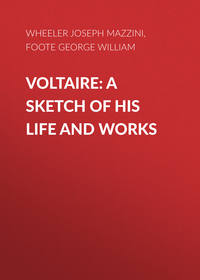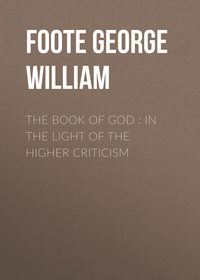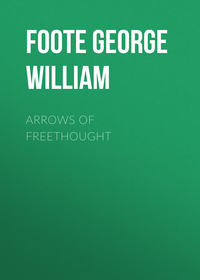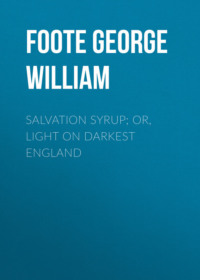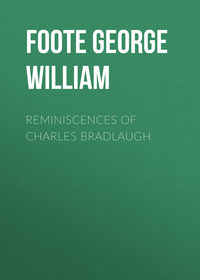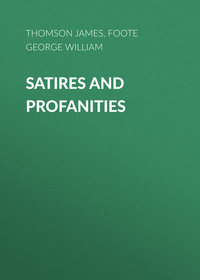 полная версия
полная версияFlowers of Freethought (First Series)
Charles Bradlaugh, on a very solemn occasion, warned the Freethought party that even in England their great fight would ultimately be with the Catholic Church. He knew that superstition was scotched, but he also knew it was far from slain. While Freethinkers are laughing at this exhibition of old rags, called the Coat of Christ, they should pause for a moment to consider the serious meaning of such a grotesque display of superstition in the land of Goethe and Heine, and in the age of Darwin. Let us jest round our camp-fires, but let us grip our sword-hilts as we hear the cries, the jingle of weapons, and the tramp of men in the camp of our enemy.
GOD-MAKING
"Man is certainly stark mad; he cannot make a flea, and yet he will be making gods by dozens." So wrote honest Montaigne, the first great sceptic in modern history, who was so far in advance of his age that he surprised the world by venturing to doubt whether it was after all a just and sensible thing to burn a man alive for differing from his neighbors.
The history of that mental aberration which is called religion, and a survey of the present state of the world, from the fetish worshipper of central Africa to the super-subtle Theist of educated Europe, furnish us with countless illustrations of the truth of Montaigne's exclamation. God-making has always been a prevalent pastime, although it has less attraction for the modern than for the ancient mind. It was a recreation in which everyone could indulge, whether learned or illiterate, young or old, rich or poor. All the material needed to fashion gods of was ignorance, and there was always an unlimited stock of that article. The artificer was imagination, a glorious faculty, which is the highest dower of the creative artist and the scientific discoverer, and in their service is fruitful in usefulness and beauty, but which in the service of theology is a frightful curse, filling the mental world with fantastic monsters who waylay and devour.
Common people, however, who did the work of the world, were not able to do much god-making. Their leisure and ability were both limited. But they had a large capacity for admiring the productions of others, and their deficiencies were supplied by a special class of men, called priests, who were set apart for the manufacture of deities, and who devoted their time and their powers to the holy trade. This pious division of labor, this specialisation of function, still continues. Carpenters and tailors, grocers and butchers, who are immersed all the week in labor or business, have no opportunity for long excursions in the field of divinity; and therefore they take their religion at second hand from the priest on Sunday. It was not the multitude, but the sacred specialists, who built up the gigantic and elaborate edifice of theology, which is a purely arbitrary construction, deriving all its design and coherence from the instinctive logic of the human mind, that operates alike in a fairy tale and in a syllogism.
Primitive man used conveniently-shaped flints before he fashioned flint instruments; discovery always preceding invention. In like manner he found gods before he made them. A charm resides in some natural object, such as a fish's tooth, a queer-shaped pebble, or a jewel, and it is worn as an amulet to favor and protect. This is fetishism. By-and-bve counterfeits are made of animals and men, or amalgams of both, and the fetishistic sentiment is transferred to these. This is the beginning of polytheism. And how far it extends even into civilised periods, let the superstitions of Europe attest. The nun who tells her beads, and the lady who wears an ornamental crucifix, are to some extent fetishists; while the Catholic worship of saints is only polytheism in disguise.
Reading the Bible with clear eyes, we see that the ancient Jews worshipped gods of their own making, which were handed down as family relics. When Jacob made tracks after sucking his uncle dry, Rachel carried off the poor old fellow's teraphim, and left him without even a god to worship. Jahveh himself, who has since developed into God the Father, was originally nothing but an image in an ark. Micah, in the book of Judges, makes himself a houseful of gods, and hires a Levite as his domestic chaplain. How long the practice persisted we may judge from the royal scorn which Isaiah pours on the image-mongers, who hewed down cedars and cypresses, oaks and ashes, some for fuel and some for idols. Let us hear the great prophet: "He burneth part thereof in the fire; with part thereof he eateth flesh; he roasteth roast, and is satisfied: yea, he warmeth himself, and saith, Aha, I am warm, I have seen the fire: And the residue thereof he maketh a god, even his graven image: he falleth down unto it, and worshippeth it, and prayeth unto it, and saith, Deliver me, for thou art my god."
Twenty-six centuries have elapsed since Isaiah wrote that biting satire, yet image-worship still prevails over three-fourths of the world; and even in Christian countries, to use Browning's phrase, we "see God made and eaten every day." A wave of the hand and a muttered spell, change bread or wafer and port-wine into the body and blood of Christ, which are joyously consumed by his cannibal worshippers.
Not even the higher divinities of the greater faiths are exempt from the universal law. They are not creatures of man's hand, yet they are creatures of his brain. What are they but his own fancies, brooded on till they become facts of memory, and seem to possess an objective existence? The process is natural and easy. A figment of the imagination may become intensely real. Have we not a clearer idea of Hamlet and Othello than of half our closest acquaintances? Feuerbach went straight to the mark when he aimed to prove "that the powers before which man crouches are the creatures of his own limited, ignorant, uncultured and timorous mind, and that in especial the being whom man sets over against himself as a separate supernatural existence in his own being."
Yes, all theology is anthropomorphism – the making of gods in man's image. What is the God of our own theology, as Matthew Arnold puts it, but a magnified man? We cannot transcend our own natures, even in imagination; we can only interpret the universe in the terms of our own consciousness, nor can we endow our gods with any other attributes than we possess ourselves. When we seek to penetrate the "mystery of the infinite," we see nothing but our own shadow and hear nothing but the echo of our own voice.
As we are so are our gods, and what man worships is what he himself would be. The placid Egyptian nature smiles on the face of the sphinx. The gods of India reflect the terror of its heat and its beasts and serpents, the fertility of its soil, and the exuberance of its people's imagination. The glorious Pantheon of Greece —
Praxitelean shapes, whose marble smilesFill the hashed air with everlasting love —embodies the wise and graceful fancies of the noblest race that ever adorned the earth, compared with whose mythology the Christian system is a hideous nightmare. The Roman gods wear a sterner look, befitting their practical and imperial worshippers, and Jove himself is the ideal genius of the eternal city. The deities of the old Scandinavians, whose blood tinges our English veins, were fierce and warlike as themselves, with strong hands, supple wrists, mighty thews, lofty stature, grey-blue eyes and tawny hair. Thus has it ever been. So Man created god in his own image, in the image of Man created he him; male and female created he them.
GOD AND THE WEATHER
With characteristic inconsistency the Christian will exclaim "Here is another blasphemous title. What has God to do with the weather?" Everything, sir. Not a sparrow falls to the ground without his knowledge, and do you think he fails to regulate the clouds? The hairs of your head are numbered, and do you think he cannot count the rain-drops? Besides, your clergy pray for a change in the weather when they find it necessary; and to whom do they pray but God? True, they are getting chary of such requests, but the theory is not disavowed, nor can it be unless the Bible is 'discarded as waste-paper; and the forms of supplication for rain and fine weather still remain in the Prayer Book, although many parsons must feel like the parish clerk who asked "What's the use of praying for rain with the wind in that quarter?"
We might also observe that as God is omnipotent he does everything, or at least everything which is not left (as parsons would say) to man's freewill, and clearly the weather is not included in that list. God is also omniscient, and what he foresees and does not alter is virtually his own work. Even if a tile drops on a man's head in a gale of wind, it falls, like the sparrow, by a divine rule; and it is really the Lord who batters the poor fellow's skull. An action for assault would undoubtedly lie, if there were any court in which the case could be pleaded. What a frightful total of damages would be run up against the defendant if every plaintiff got a proper verdict! For, besides all the injuries inflicted on mankind by "accident," which only means the Lord's malice or neglect, it is a solemn fact (on the Theist's hypothesis) that God has killed every man, woman, and child that ever died since the human race began. We are born here without being consulted, and hurried away without the least regard to our convenience.
But let us keep to the weather. A gentleman who was feeding the fish at sea heard a sailor singing "Britannia rules the waves." "Does she?" he groaned, "Then I wish she'd rule them straighter." Most of us might as fervently wish that the Lord ruled the weather better. Some parts of the world are parched and others flooded. In some places the crops are spoiled with too much sun, and in others with too little. Some people sigh for the sight of a cloud, and others people see nothing else. Occasionally a famine occurs in India which might have been averted by half our superfluity of water. Even at home the weather is always more or less of a plague. Its variation is so great that it is always a safe topic of conversation. You may go out in the morning with a light heart, tempted by the sunshine to leave your overcoat and umbrella at home; and in the evening you may return wet through, with a sensation in the nose that prognosticates a doctor's bill. You may enter a theatre, or a hall, with dry feet, and walk home through a deluge. In the morning a south wind breathes like zephyr on your cheeks, and in the evening your face is pinched with a vile and freezing northeaster.
"Oh," say the pious, "it would be hard to please everybody, and foolish to try it. Remember the old man and his ass." Perhaps so, but the Lord should have thought of that before he made us; and if he cannot give us all we want, he might show us a little consideration now and then. But instead of occasionally accommodating the weather to us, he invariably makes us accommodate ourselves to the weather. That is, if we can. But we cannot, at any rate in a climate like this. Men cannot be walking almanacks, nor carry about a wardrobe to suit all contingencies. In the long run the weather gets the better of the wisest and toughest, and when the doctors have done with us we head our own funeral procession. The doctor's certificate says asthma, bronchitis, pulmonary consumption, or something of that sort. But the document ought to read "Died of the weather."
Poets have sung the glory of snowy landscapes, and there is no prettier sight than the earth covered with a virgin mantle, on which the trees gleam like silver jewels. But what an abomination snow is in cities. The slush seems all the blacker for its whiteness, and the pure flakes turn into the vilest mud. Men and horses are in a purgatory. Gloom sits on every face. Pedestrians trudge along, glaring at each other with murderous eyes; and the amount of swearing done is enough to prove the whole thing a beastly mistake.
It seems perfectly clear that when the Lord designed the weather, two or three hundred million years ago, he forgot that men would build cities. He continues to treat us as agriculturalists, even in a manufacturing and commercial country like this. "Why should people get drenched in Fleet-street while the Buckinghamshire farmers want rain? The arrangement is obviously stupid. God Almighty ought to drop the rain and snow in the country, and only turn on enough water in the cities to flush the sewers. He ought also to let the rain fall in the night. During the daytime we want the world for our business and pleasure, and the Rain Department should operate when we are snug in bed. This is a reforming age. Gods, as well as men, must move on. It is really ridiculous for the Clerk of the Weather to be acting on the old lines when everybody down below can see they are behind the time. If he does not improve we shall have to agitate on the subject Home Rule is the order of the day. We need Home for the globe, and we cannot afford to let the weather be included in the imperial functions. It is a domestic affair. And as the Lord has considerably mismanaged it, he had better hand it over to us, with full power to arrange it as we please."
MIRACLES
What is a miracle? Some people would reply, an act of God. But this definition is far too wide. In the theistic sense, it would include everything that happens; and in the sense of our archaic bills of lading, it would include fire and shipwreck.
Others would reply, a miracle is a wonder. But this definition would include every new, or at least every surprising new fact. A black swan would have been a wonder before Australia was discovered, but it would have been no miracle. Railways, telegraphs, telephones, electric light, and even gas light, would be wonders to savages, yet neither are they miracles. One of the Mahdi's followers was astonished by an English officer, who pulled out his false eye, tossed it in the air, caught it, and replaced it; after which he asked the flabbergasted Arab whether his miraculous Mahdi could do that. It was a greater wonder than the Mahdi could perform; still it was not a miracle. Ice was so great a wonder to the King of Siam that he refused to credit its existence. Yet it was not miraculous, but a natural product, existing in practically unlimited quantities in the polar regions. We might multiply these illustrations ad infinitum, but what we have given will suffice. If not, let the reader spend an evening at Maskelyne and Cooke's, where he will see plenty of startling wonders and not a miracle amongst them.
Hume's definition of a miracle as a violation of a law of nature, is the best ever given, and it really is as perfect as such a definition can be. It has been carped at by Christian scribblers, and criticised by superior theologians like Mozley. But, to use Mr. Gladstone's phrase, it keeps the field. Even the criticisms of Mill and Huxley leave its merit unimpaired. The ground taken by these is, that to say a miracle is a violation of a law of nature is to prejudge the question, and to rule out all future facts in the interest of a prepossession. Mill, however, allows that a miracle is a violation of a valid induction, and as a law of nature means nothing more it is difficult to understand why he takes any exception to Hume's statement of the case. It is perfectly obvious that Hume's argument is not metaphysical, but practical. He does not discuss the possibility but the probability of miracles. He reduces the dispute to a single point, namely, whether the person who relates a miracle (for to the world at large the question is necessarily one of testimony) is deceived or deceiving, or whether the otherwise universal experience of mankind is to be disbelieved; in other words, whether he or the rest of the world is mistaken. One man may, of course, be right, and all the human race opposed to him wrong, but time will settle the difference between them. That time, however, simply means general experience through long ages; and that is precisely the tribunal which Hume s argument appeals to.
Quarrelling with Hume's definition is really giving up miracles altogether, for, except as supernatural evidence, they are no more important than shooting stars. The very nature of a miracle, in whatever formula it may be expressed, is superhuman, and having a purpose, it is also supernatural; in other words, it is a special manifestation of divine power for a particular object. Whether, being so, it is a violation, a contravention, or a suspension of the laws of nature, is a mere question about words.
We may say that a miracle has three elements. It is first a fact, unaccountable by science; secondly, it requires a conscious agent; and thirdly, it results from the exercise of a power which that agent does not naturally possess.
Let us descend to illustration. Huxley takes the following case. Suppose the greatest physiologist in Europe alleged that he had seen a centaur, a fabulous animal, half man and half horse. The presumption would be that he was laboring under hallucination; but if he persisted in the statement he would have to submit to the most rigorous criticism by his scientific colleagues before it could be believed; and everybody would feel sure beforehand that he would never pass through the ordeal successfully. The common experience, and therefore the common sense, of society would be dead against him, and probably he would be refused the honor of examination even by the most fervid believers in ancient miracles.
But after all the centaur, even if it existed, would not be a miracle, but a monstrosity. It does not contain the three elements we have indicated. Real miracles would be of a different character. Plenty may be found in the Bible, and we may make a selection to illustrate our argument. Jesus Christ was once at a marriage feast, when the wine ran short, which was perhaps no uncommon occurrence. Being of a benevolent turn of mind, and anxious that the guests should remember the occasion, he turned a large quantity of cold water into fermented juice of the grape. Now water contains oxygen and hydrogen in definite proportions, and nothing else, while wine contains in addition to these, carbon and other elements, being in fact a very complex liquid. Jesus Christ must, therefore, in turning water into wine, have created something, and that transcends human power. Here, then, we have a complete miracle, according to Hume's definition and our own theory.
We do not say the miracle never occurred, although we no more believe in it than we believe the moon is made of green cheese. We are willing to regard it as susceptible of proof. But does the proof exist? To answer this we must inquire what kind of proof is necessary. An extraordinary story should be supported by extraordinary evidence. It requires the concurrent and overwhelming testimony of eye-witnesses. We must be persuaded that there is no collusion between them, that none of them has anything to gain by deception, that they had no previous tendency to expect such a thing, and that it was practically impossible that they could be deluded. Now let any man or any Christian seriously ask himself whether the evidence for Jesus Christ's miracle is of this character. Four evangelists write his life, and only one mentions the occurrence. Even he was certainly not an eye-witness, nor does he pretend to be, and the weight of evidence is against his gospel having been written till long after the first disciples of Jesus were dead. But even if the writer distinctly declared himself an eye-witness, and if it were undeniable that he lived on the spot at the time, his single unsupported testimony would be absurdly inadequate to establish the truth of the miracle. Every reader will at once see that the established rules of evidence are not conformed to, and whoever accepts the miracle must eke out reason with faith.
So much for the evidence of miracles. Their intellectual or moral value is simply nil. The greatest miracle could not really convince a man of what his reason condemned; and if a prophet could turn water into wine, it would not necessarily follow that all he said was true. In fact, truth does not require the support of miracles; it flourishes better without their assistance. Universal history shows that miracles have always been employed to support falsehood and fraud, to promote superstition, and to enhance the profit and power of priests.
A REAL MIRACLE.9
It is a common belief among Protestants, though not among Catholics, that the age of miracles is past. For a long time it has been very difficult to find a real case of special providence. There are stories afloat of wonderful faith-cures, and the followers of John Wesley, as well as the followers of William Booth, often shake their heads mysteriously, and affect to trace the hand of God in certain episodes of their experience. But such cases are too personal, and too subjective, to challenge criticism or inquiry. Investigating them is like exploring a cloud. There is nothing tangible for the mind to seize, nothing to stand by as the basis of discussion. What is wanted is a real objective miracle, a positive fact. Happily such a miracle has come to the aid of a distressed Christianity; it is worth tons of learned apologetics, and will give "the dying creed" a fresh lease of life.
Unfortunately the world at large is in gross ignorance of this astonishing event. Like the earthquake, the eclipse, and the wholesale resurrection of saints at the crucifixion of Christ, it has excited very little public attention. But this dense apathy, or Satanic conspiracy of silence, must not be allowed to hide a precious truth. We therefore do our best to give it publicity, although in doing so we are blasting our own foundations; for we belong to a party which boasts that it seeks for truth, and we are ready to exclaim, "Let truth prevail though the heavens fall."
Most of our readers will remember the late accident on the Brighton line at Norwood. A bridge collapsed, and only the driver's presence of mind averted a great loss of life. Of course the driver did his obvious duty, and presence of mind is not uncommon enough to be miraculous. But that does not exhaust the matter. The driver (Hargraves) is perfectly sure he received divine assistance. He is a man of pious habits. He never leaves his house without kneeling down with his wife and imploring God's protection. He never steps on the engine without breathing another prayer. On the morning of the accident his piety was in a state of unusual excitation. He begged his wife to "pray all that day" – which we presume she did, with intervals for refreshment; and he knelt down himself in the passage before opening his front door. When the accident happened he put the brake on and cried "Lord, save us," and according to the Christian World "it has since been stated by expert engineers that no train was ever before pulled up in such a short distance."
A carping critic might presume to ask the names and addresses of these "expert engineers." He might also have the temerity to inquire the precise distance in which the train was pulled up, the shortest distance in which other trains have been pulled up, and the weight and velocity of the train in each case. He might also meanly suggest that putting on the brake left as little as possible to Providence. For our part, however, we will not pursue such hyper-criticism. It is applying to a miracle a test which it is not fitted to stand. Something must be left to faith, something must be reserved from reason, or the stoutest miracle would soon fall into a galloping consumption. The man in whom a pious disposition counteracts the restless play of thought, will not demand absolute proof; he will only require an encouraging amount of evidence; and he will dutifully lift his face and hands to heaven, exclaiming, "Lord I believe, help thou mine unbelief."
The line we shall follow is a different one. Without questioning the miracle, we venture to ask why it was not more complete. Lives were saved, but several persons were injured. Was this due to the fact that Hargraves' prayer was not sufficiently above proof? Did the Lord answer the prayer according to its insensity? Was there a sceptic in the train who partially neutralised its effect? Or did the Lord proceed on the method favored by priests, preventing the miracle from being too obvious, but giving the incident a slightly supernatural appearance, in order to confirm the faith of believers without convincing the callous sceptics, whose deep sin of incredulity places them beyond "the means of grace and the hope of glory?"


